Bangkok-based Robert Tyler recalls how close he and his team came to conquering Denali, formerly Mt McKinley, the highest mountain in North America
"The moment the diagnosis was made it felt like a death sentence. Cancer at 40 with two kids still dependent on their mom …"
The simple fact is this: when you go to Alaska, you get your ass kicked.
The simple fact is this: when you go to Alaska, you get your ass kicked.
Not for the first time, climber Matthew Twight’s words came to mind. With crampons fixed firmly in the snow, our team crouched in defiance of the electric storm that hummed around us. Josh, our youngest climber, cradled his damaged hand. He had been injured by an electric shock when unclipping his metal carabiner from the conductive nylon rope that threatened to shock the whole team.
I threw my metal axe to the side and waited for instructions from Chad, our talisman and lead guide. In the deteriorating visibility I discerned a radio abandoned in the snow; one of the many metallic items discarded by the team after the first shock. Would I feel the lightening rod that killed me or would the lights just mercifully go out? The anticipation was sickening.
We were 200 metres from the summit of the highest mountain in North America. At 6190 metres, Denali was the dominant peak of the austere and impenetrable Alaska Range. Three weeks earlier, we had been nine jet-lagged strangers sitting in a circle in a bland Anchorage travel lodge. Like practitioners of meditation, each climber took turns to share their intention; why they were choosing to subject themselves to three weeks of extreme physical exertion, sleep deprivation from 24/7 daylight, the constant threat of cold injuries, and the disjointing effects of high altitude. I hadn’t been ready to explain that I sought restoration following a turbulent series of life events. There are things you share with a room full of strangers, and things you don’t.
I threw my metal axe to the side and waited for instructions from Chad, our talisman and lead guide. In the deteriorating visibility I discerned a radio abandoned in the snow; one of the many metallic items discarded by the team after the first shock. Would I feel the lightening rod that killed me or would the lights just mercifully go out? The anticipation was sickening.
We were 200 metres from the summit of the highest mountain in North America. At 6190 metres, Denali was the dominant peak of the austere and impenetrable Alaska Range. Three weeks earlier, we had been nine jet-lagged strangers sitting in a circle in a bland Anchorage travel lodge. Like practitioners of meditation, each climber took turns to share their intention; why they were choosing to subject themselves to three weeks of extreme physical exertion, sleep deprivation from 24/7 daylight, the constant threat of cold injuries, and the disjointing effects of high altitude. I hadn’t been ready to explain that I sought restoration following a turbulent series of life events. There are things you share with a room full of strangers, and things you don’t.
"Denali, a spiritual sanctuary for indigenous Alaskans, presents a unique set of challenges for climbers"
Denali, formerly Mt McKinley, is a sacred mountain. A spiritual sanctuary for indigenous Alaskans, it remains undefiled by roads, infrastructure and connectivity of any kind. For climbers, this mountain ethic of total self-reliance presents a unique set of challenges: your pack and sled must contain sustenance for a minimum of three weeks, and whatever goes in must be dragged out. This includes feces, which are discharged - usually when squatting in the vestibule of your tent - into a screw-top plastic container. The importance of good bathroom manners in close quarters reinforces the Alaskan adage, “On Denali you need a good camper; not a good climber.”
Our adventurous delivery into the heart of the Alaska Range was by two Twin Otter aircraft; stylish aviation antiques configured with skis for glacier landings. Ominously, the pilots had delayed our departure in a last-minute gear switch between aircraft to match the passenger manifest. The sobering explanation given was that if a plane crashed, survivors could salvage their personal gear for the hike out.
From the skies we wistfully watched civilisation slip away, finally crossing that frontier separating months of preparation and dreaming from the true start of an expedition. It is an imaginary boundary that when crossed always announces itself as nervous energy in my stomach. We bade farewell to the Talkeetna river and inconceivably vast Alaskan forest as we passed over a dizzying network of rugged, snow-filled valleys. As we pushed deeper towards the lesser peaks of the range, our human faculties struggled to perceive the exponential increase in scale and grandeur of the topography around us.
Our adventurous delivery into the heart of the Alaska Range was by two Twin Otter aircraft; stylish aviation antiques configured with skis for glacier landings. Ominously, the pilots had delayed our departure in a last-minute gear switch between aircraft to match the passenger manifest. The sobering explanation given was that if a plane crashed, survivors could salvage their personal gear for the hike out.
From the skies we wistfully watched civilisation slip away, finally crossing that frontier separating months of preparation and dreaming from the true start of an expedition. It is an imaginary boundary that when crossed always announces itself as nervous energy in my stomach. We bade farewell to the Talkeetna river and inconceivably vast Alaskan forest as we passed over a dizzying network of rugged, snow-filled valleys. As we pushed deeper towards the lesser peaks of the range, our human faculties struggled to perceive the exponential increase in scale and grandeur of the topography around us.
"Ascending to higher camps meant greater exposure to scything winds that would frostbite unprotected fingers in seconds." | Our plane’s tiny shadow was soon dwarfed by giant glaciers that crumpled and collapsed into desolation. From my seat in the cockpit, I watched anthracite saw-tooth ridges from prehistory pass just metres from our wing tips. The plane arched and barely cleared a bower of hanging ice as we dived down with a thud on the powdered glacier below. Denali is unique amongst the Seven Summits in that porterage is not available. You are your Sherpa, and your first two weeks are spent dragging sleds of fuel and rations up crevassed glaciers to higher camps. After caching gear in great snow holes for future use, the team returns to reap the benefit of accelerated recovery that comes with sleeping at lower altitudes. |
We were all surprised how quickly the mountain claimed the first of our team. A serious case of exhaustion required a complex medical evacuation made possible only by an available helicopter and a rare weather window. It felt mercenary to salvage necessities from our team member’s abandoned pack. When doing so I discovered a number of fatal luxuries that would surely have exceeded the recommended 25kg.
It was then that Denali’s infamously treacherous weather confined us to our tents for three days. As temperatures dropped and winds increased, a frantic hour was spent carving out and stacking blocks of snow for protection. The hiatus was amiably spent rapport-building until Peter, an experienced Scandinavian climber, made the irreversible mistake of mentioning his girlfriend to the assembly of all-male tent occupants. Opening the tent flap to expel the thick vapours of unbridled masculinity was made impossible by the -40°C gusts outside.
Ascending to higher camps meant greater exposure to scything winds that would frostbite unprotected fingers in seconds. Gear reserved for extreme conditions was now being pulled from the bottom of our packs. On clear days we found ourselves coating the insides of our nostrils with sunscreen due to the reflectivity of the snow. Neglecting small details could now have dramatic consequences. One morning the team woke to find our ground sheet coated in a thin layer of yellow ice. There was no way to hide that I hadn’t fixed the cap on my pee
bottle properly. To conserve energy, the incident was shrugged off and judgement suspended till lower altitudes.
Just five remaining climbers from our original nine were nearing the last day of food rations when a weather window appeared for a summit attempt. An earlier attempt had been abandoned following a dramatic weather change while traversing the Autobahn, a section that has claimed more lives on Denali than any. We knew it was now or never. Our two rope teams made good of their experience, preparation and teamwork by moving up the mountain in a glorious fashion. We enjoyed blue skies and 360-degree views into the great Alaskan beyond; this was the climbing we had come so far and trained so hard for.
We were 200 metres from the summit when we heard peals of thunder from the thermal rivers of weather barreling up the valleys below.
It was then that Denali’s infamously treacherous weather confined us to our tents for three days. As temperatures dropped and winds increased, a frantic hour was spent carving out and stacking blocks of snow for protection. The hiatus was amiably spent rapport-building until Peter, an experienced Scandinavian climber, made the irreversible mistake of mentioning his girlfriend to the assembly of all-male tent occupants. Opening the tent flap to expel the thick vapours of unbridled masculinity was made impossible by the -40°C gusts outside.
Ascending to higher camps meant greater exposure to scything winds that would frostbite unprotected fingers in seconds. Gear reserved for extreme conditions was now being pulled from the bottom of our packs. On clear days we found ourselves coating the insides of our nostrils with sunscreen due to the reflectivity of the snow. Neglecting small details could now have dramatic consequences. One morning the team woke to find our ground sheet coated in a thin layer of yellow ice. There was no way to hide that I hadn’t fixed the cap on my pee
bottle properly. To conserve energy, the incident was shrugged off and judgement suspended till lower altitudes.
Just five remaining climbers from our original nine were nearing the last day of food rations when a weather window appeared for a summit attempt. An earlier attempt had been abandoned following a dramatic weather change while traversing the Autobahn, a section that has claimed more lives on Denali than any. We knew it was now or never. Our two rope teams made good of their experience, preparation and teamwork by moving up the mountain in a glorious fashion. We enjoyed blue skies and 360-degree views into the great Alaskan beyond; this was the climbing we had come so far and trained so hard for.
We were 200 metres from the summit when we heard peals of thunder from the thermal rivers of weather barreling up the valleys below.
"Just five remaining climbers from our original nine were nearing the last day of food rations when a weather window appeared for a summit attempt. We knew it was now or never."
The weather had turned thicker and the thunder had grown closer when Chad heard over the radio that a climber further down the mountain had suffered an electric shock. Moments later, Chad convulsed and threw off his metal picket-lined pack. He too was hit by a strong shock. Josh was next. It is difficult to recall how long we waited on the mountainside before we got the frantic call to descend. Sensing imminent danger, we fumbled to ready our gear, some of which had become static, and gingerly reconnected our metal carabiners to the conductive rope.
Our progress down the ridge was slowed by Josh’s injured
hand, and only when safely in our sleeping bags that night
did we finally feel outside the mountain’s dark shadow.
The three-day walkout gave us time to reconcile the conflicting emotions of relief and disappointment we all shared. If any feelings of failure lingered, these later evaporated leaving only profound gratitude for experiencing such an extraordinary place. This sense of privilege only grows with the passing of time; cherished memories of what it was to have existed and survived, even for a short time, inside the frozen bell jar of one of nature’s last Edens.
Our progress down the ridge was slowed by Josh’s injured
hand, and only when safely in our sleeping bags that night
did we finally feel outside the mountain’s dark shadow.
The three-day walkout gave us time to reconcile the conflicting emotions of relief and disappointment we all shared. If any feelings of failure lingered, these later evaporated leaving only profound gratitude for experiencing such an extraordinary place. This sense of privilege only grows with the passing of time; cherished memories of what it was to have existed and survived, even for a short time, inside the frozen bell jar of one of nature’s last Edens.

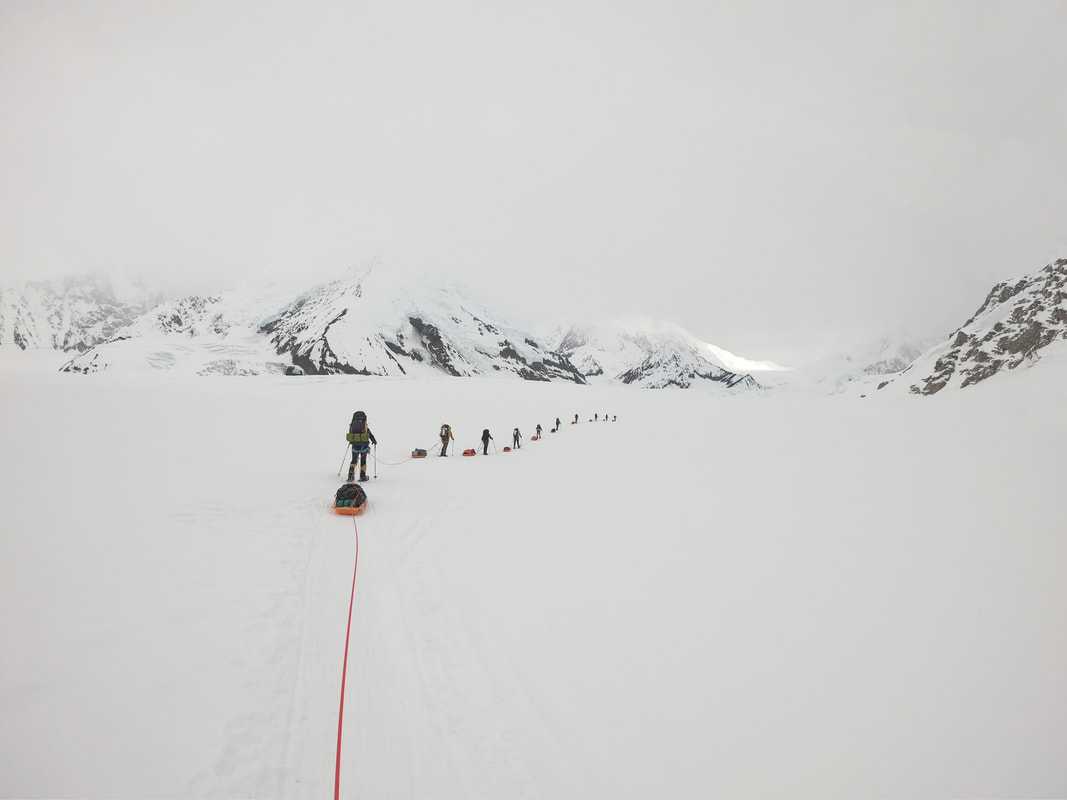
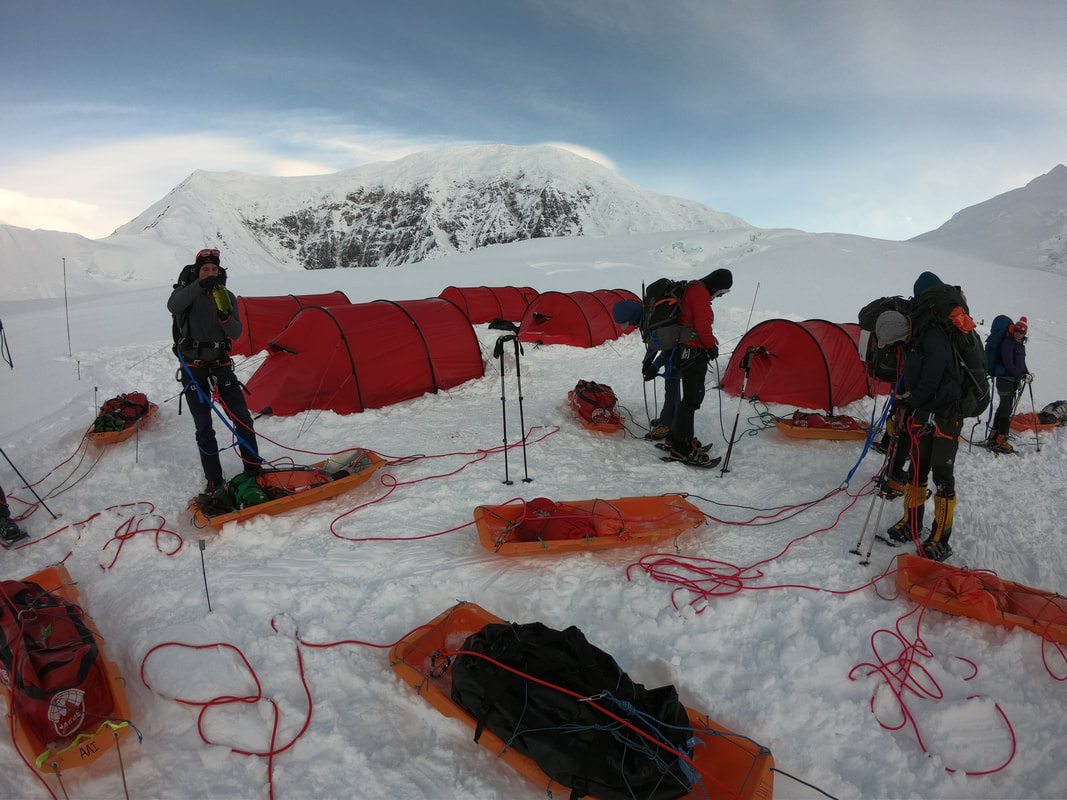
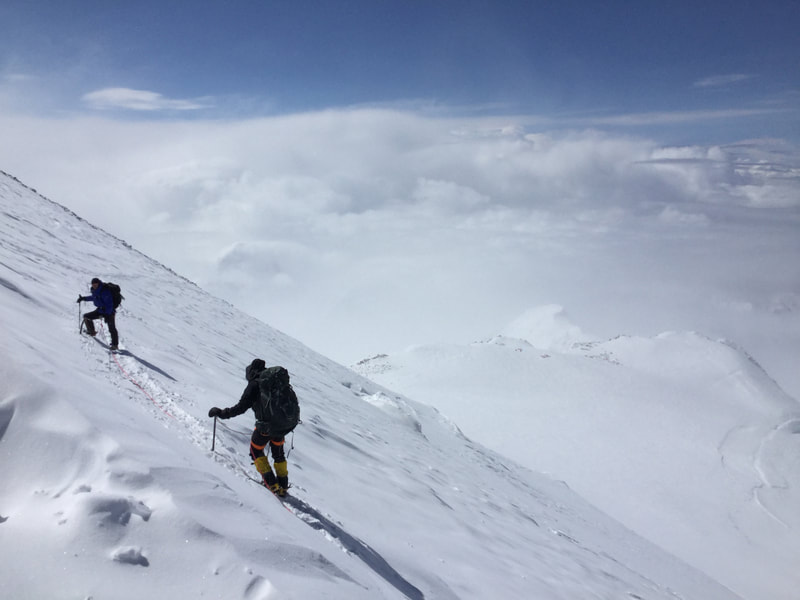
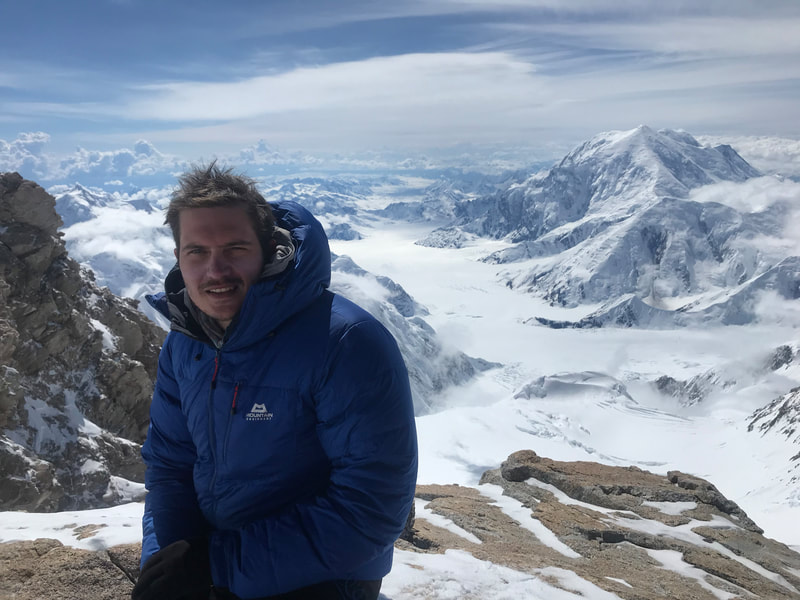
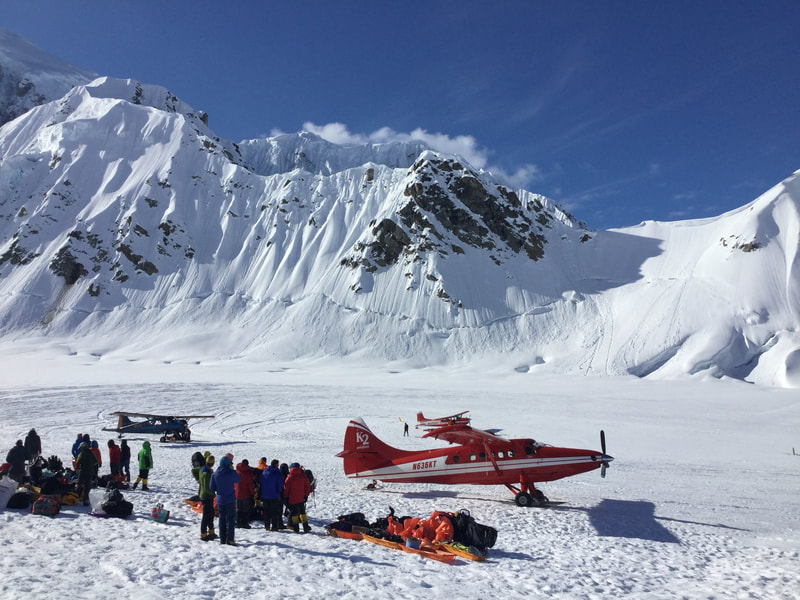
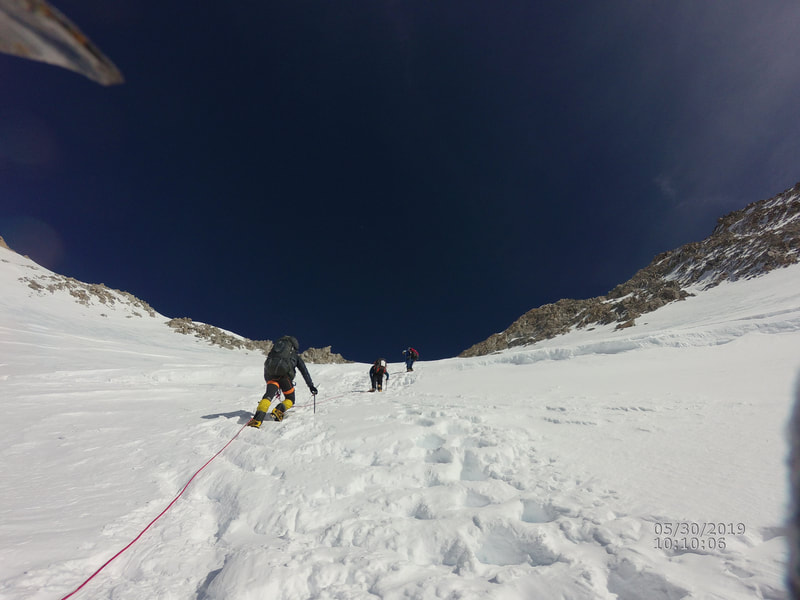
 RSS Feed
RSS Feed
















